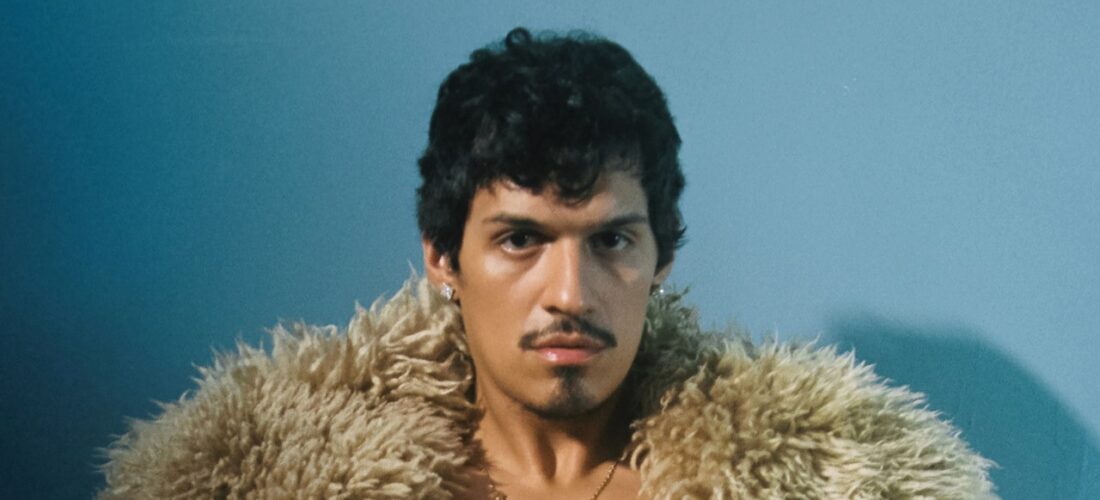God Said No
On his second album, God Said No, Omar Apollo wields his heartbreak like a butterfly knife. On “Done With You,” an airy, brass-assisted pop song, he cloaks moments of devastating vulnerability with a protective layer of detached cool. In the shrugged-off chorus, he insists that he’s done with his lover—a toughness that stands in stark contrast to his earlier, velvety pleas for them to let him go. The video matches this energy, depicting the star as he alternates between waving blades at the viewer and running them painfully along his jawline. It’s a fitting visual representation of a record where Apollo sharpens some of his darkest moments into glinting pop gems.
God Said No originated from three months Apollo spent in London in 2023. Following the release of his debut full-length Ivory in 2022, tours with SZA and Billie Eilish, and a nomination for Best New Artist at the 2023 Grammys, the Mexican American singer-songwriter was riding a professional high, but privately nursing a broken heart as he surveyed the wreckage of a relationship. Working with familiar collaborators Teo Halm (here as executive producer), Carter Lang, and Blake Slatkin, Apollo first sketched out the 14 songs in the prestigious Abbey Road Studios, later finishing the album in the U.S. With his biggest hit to date being the gut-wrenching “Evergreen (You Didn’t Deserve Me at All),” Apollo already has something of a reputation as a heartbreak aficionado—as he recently told Complex, “my natural state is always longing.” But on this record, he paints that emotion with every shade on his palette. God Said No stretches far beyond downbeat balladeering; Apollo weaves his sadness, anger, and self-doubt through a collection of anthemic choruses and disco-tinged pop tracks.
On “Less of You” and “Drifting,” Apollo recalls Robyn’s style of tearful dancefloor anthem, the former combining Giorgio Moroder-esque vocoder melodies with a eulogy for a relationship that’s slowly evanescing, and the latter sprinkling Apollo’s romantic disillusionment over a breezy, Balearic-type beat. These shades of understated Europop are a new element of Apollo’s sound, brooding where once he might have belted. But his voice remains the star of the show, particularly when he’s trading gorgeous, tumbling melodies with Sudanese Canadian singer-songwriter Mustafa on the plaintive “Plane Trees.”
While they are often luxurious to listen to, Apollo’s ballads represent the album’s least compelling moments. “Empty” and “Dispose of Me” meander drowsily, doing little to distinguish this record from his previous bedroom R&B releases. A meditative voice note about grief from Pedro Pascal also wears thin on repeat listens. The album is more arresting when Apollo knowingly leans into the more unhinged aspects of heartbreak. Take the rousing lead single, “Spite,” where, with a hook that bristles with delicious fury, Apollo walks a razor-thin line between loving and hating the partner who’s keeping him hanging on. Over sulky licks of guitar, he brings the confusing loneliness of a situationship to life through bittersweet vignettes of dying flowers, unread text messages, and long flights taken alone. Elsewhere, he howls an embittered and desperate hook on the expansive “How,” his anger as coldly insistent as the drum machine that backs it.
These wild-eyed moments hint at more complex and ambitious possibilities for Apollo as a storyteller and as a pop star. On “Life’s Unfair,” a strutting funk-pop song, Apollo coolly admits to doing “something real bad” to someone he once wanted to marry. The trap-inflected standout “Against Me” takes a kind of hyper-masculine, posturing response to being dumped. On these songs, Apollo may be full of longing, but he’s also flawed, fired-up, and the self-proclaimed “baddest bitch.” God Said No stands apart from Apollo’s previous releases not only because of its genre experimentation and its stickier choruses, but for its willingness to get ugly. Here, Apollo has been knocked down, but he doesn’t play the victim. Instead, he bares his teeth.
All products featured on Pitchfork are independently selected by our editors. However, when you buy something through our retail links, we may earn an affiliate commission.
